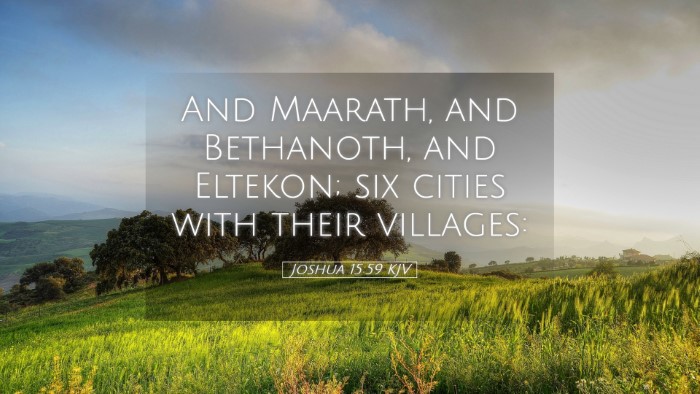Commentary on Joshua 15:59
Verse Overview: Joshua 15:59 identifies various cities of the tribe of Judah, emphasizing the intricate details regarding the inheritance of land by the Israelites. This verse is part of a larger narrative that outlines the territorial divisions following the conquest of Canaan. The mention of these cities serves as a reminder of God's faithfulness to His promises.
Contextual Background
The Book of Joshua stands as a crucial transition from the wilderness wanderings of the Israelites to their establishment in the Promised Land. This new chapter is marked by conquest, distribution of land, and the recognition of God’s promises realized. As we approach Joshua 15, we witness the allotment of land to the tribe of Judah, highlighting both geographical and spiritual significance.
Insights from Commentaries
Matthew Henry's Commentary
Matthew Henry outlines that in this chapter, the land was assigned particularly to the tribe of Judah, which was the largest tribe and held a significant role in Israel’s history. He emphasizes that the cities mentioned serve not only as geographical markers but also encapsulate the faithfulness of God in delivering the land to His people. Henry notes, "The more particular the places are reckoned up, the more certain and sure is the possession of the land." He further reflects on the importance of memory in spiritual life and the need for believers to remember God’s past provisions.
Albert Barnes' Commentary
Albert Barnes offers a detailed historical perspective, stressing that the cities listed in Joshua 15:59 were vital for trade, defense, and community life. He suggests that the diverse cities depict the richness of Judah's inheritance, echoing God’s intention to bless His people abundantly. Barnes articulates, "It is necessary for us to observe these geographical references as they connect the faith of the community to the land given." This commentary also probes deeper into the implications of land possession, noting how land for the Israelites represented not just territory but a fulfillment of divine promise.
Adam Clarke's Commentary
Adam Clarke delves into the etymology and significance of the cities mentioned. His analysis provides insight into how these cities reflect the spiritual journey of Israel. Clarke asserts, "The mention of these towns not only delineates territory; they symbolize God’s steadfast commitment to His covenant people." Furthermore, he notes the importance of community and governance established through these cities, illustrating that God cares about the societal structures within His nation.
Theological Reflections
- Covenant Faithfulness: The inheritance of the land signifies God’s unwavering promise to His people, underscoring the theological point that God is faithful to His covenant.
- Memory and Heritage: The detailed listing of cities serves as a reminder for contemporary believers to cherish their spiritual heritage and acknowledge God’s past deeds.
- Community and Society: The cities symbolize not merely geographical territories but the establishment of community and social order under God’s governance.
Practical Applications
For pastors and spiritual leaders, this passage underlines the importance of guiding congregations in understanding their spiritual inheritance in Christ. It calls for the remembrance of God’s faithfulness in personal and communal contexts, encouraging believers to trust in God's promises for their future.
Students and theologians may derive insights regarding the significance of land in biblical narrative as a metaphor for spiritual inheritance. The cities of Judah remind us of the importance of maintaining our spiritual heritage and the faithfulness of God amidst changing circumstances.
Conclusion
In summary, Joshua 15:59, while seemingly a simple listing of cities, opens a window into the rich theological and historical tapestry of God's relationship with His people. Through the reflections of commentators like Matthew Henry, Albert Barnes, and Adam Clarke, we are reminded of the faithfulness of God, the importance of remembering His works, and the implications for community life. The text calls contemporary believers to anchor their faith in God’s promises, participate in their spiritual inheritance, and nurture their community in faith.


